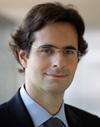Reyl treads pragmatic path towards growth

Thomas de Saint-Seine, Reyl & Cie
Swiss boutique Reyl & Cie favours a disciplined approach whether building client portolios or eyeing up expansion opportunities in domestic and overseas markets
Geneva-based asset and wealth management group Reyl & Cie, is fast building up an international following, yet is not taking its eye off potential opportunities on its own doorstep.
The recent acquisition of the $500m (€363m) Solitaire wealth management business in Zurich, along with seven staff, has now boosted client assets to $5.5bn, $2bn of which is managed in collective funds and mandates for third party clients.
“For Swiss banks and asset management companies, 70 per cent of the activity lies in the German part of the country,” says Thomas de Saint-Seine, portfolio manager and co-head of the executive board at Reyl Asset Management. “If you want to grow and develop, you need a Zurich presence.”
Reyl has realistic rather than astronomical targets, bearing in mind its boutique status, expecting to attract at least SFr1bn (E0.8bn) of new assets to its fund base by the end of 2013 from Zurich-based customers alone. That is not to forget its quiet ambitions in the Italian and French-speaking Swiss cantons, plus distribution plans in Italy, France, the Benelux and Nordic regions, the UK and Australia.
Among the Ucits IV-compliant products earmarked for these jurisdictions are funds investing in European and emerging market equities. Equities are managed through a quantitative process, which also takes account of fundamental and behavioural factors. The systematic investment approach of Reyl European Equities, the group’s flagship product, has led to an annual 8 per cent return for seven years since launch, compared to 2 per cent for the MSCI Europe Total Return index, claims Mr de Saint-Seine.
“In the quant sphere, there are many possibilities,” he admits. “You can do pure data mining, or you can use some criteria to be very strict and disciplined when you pick stocks.”
Reyl has opted for the latter, having developed three blocks as part of its overall investment strategy. Firstly, there is a bias to picking those stocks generating strong operating cash flow, undervalued relative to peers, with good control of their capital expenditure. In addition to this value-oriented approach, there is also a parallel, more defensive play, focusing on high and stable dividend paying stocks with strong fundamentals.
Thirdly there are the Garp (growth at reasonable price) strategies, which attempt to capture underlying investment themes. These include commodities, domestic growth and companies exporting goods to emerging markets. “Stocks following these themes typically have a higher information ratio than the market average,” says Mr de Saint-Senne.
The philosophy is that all of its three strands are capable of producing alpha, but not at the same time in the market cycle. While value strategies outperform in the recovery stage of a cycle, Garp investments are favoured in expansion mode and defensive stocks when capital preservation is key during a correction phase.
The Reyl system is designed to create an allocation between three blocks of stocks to aid navigation across market cycles to achieve a stable and solid mix of strategies within an equity portfolio. “Quant methodology for us means we want to remain extremely disciplined,” says Mr de Saint-Seine. “We never want to meet with the management of companies, as we think that is a distraction.”
The group screens 1,5000 European stocks and 3,500 across emerging economies, with each company requiring a minimum capitalisation of $150m. There are typically 50 to 120 stocks held within each portfolio strategy. Percentages are derived through quantitative portfolio optimisation techniques. “We don’t fall in love with our stocks, which is the number one risk of discretionary fund managers,” says Mr Saint-Seine.
At the same time, he is proud of some recent trades, such as the purchase of Norwegian oil producer Den Norske, which profited from a subsequent 60 per cent price hike following positive exploration work. “With our relatively large universe, we can find such special situations,” he says. “These stocks are not present in all indexes such as the MSCI Europe.”
While many Swiss private banks are currently taking refuge in local stocks, which they perceive as being both safe and diversified to emerging market growth opportunities, Reyl’s process currently favours German and UK stocks. “Swiss companies such as Nestlé have much more exposure to global growth, but there are better pure players, more focused on emerging economies, within the UK market.”





